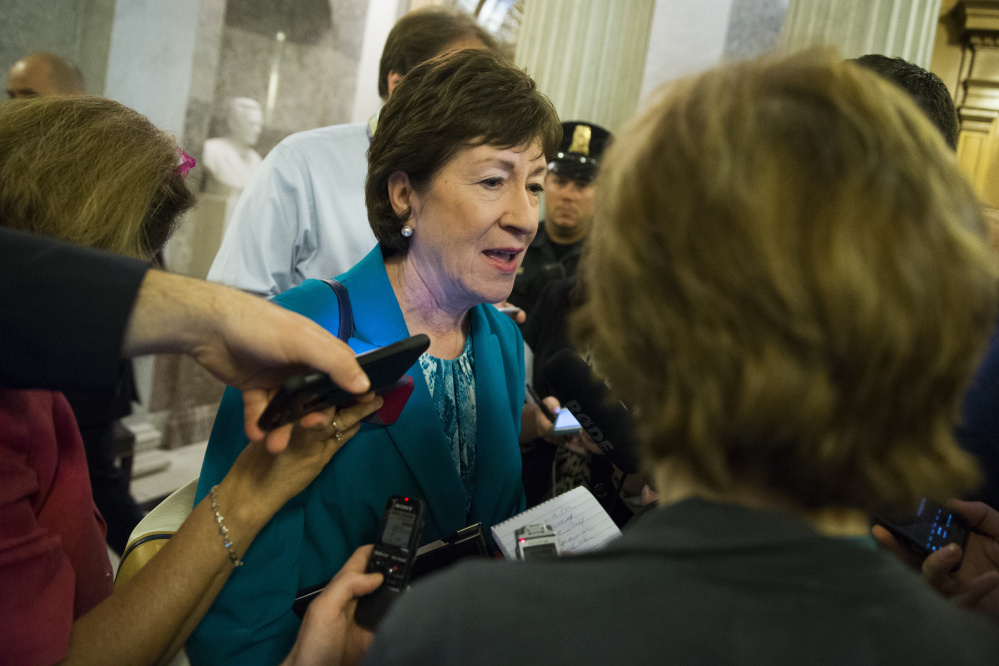WASHINGTON — Two members of Maine’s congressional delegation were at the center of an intense debate about gun control on Capitol Hill this week that came to a head during an extraordinary 25-hour protest on the floor of the House of Representatives by Democrats demanding votes on gun bills.
Exhausted but exuberant, House Democrats vowed to fight on for gun control Thursday as they ended their dramatic sit-in with songs, prayers and defiant predictions of success. Republicans countered by denying the Democrats’ demands and holding a Senate vote designed to show that bipartisan gun legislation is unlikely pass.
In the Senate, a compromise bill proposed by Republican Sen. Susan Collins of Maine to block suspected terrorists on the “no-fly” and “selectee” lists from getting guns made it across a legislative hurdle on a 52-46 vote, but may not have enough support to go further.
A visibly deflated Collins suggested Senate leaders were intentionally draining support from her bill by allowing a Republican alternative to also come to a vote.
“Let us not miss an opportunity to get something done,” she pleaded on the Senate floor.
On Wednesday morning, rallying around the slogan “no bill, no break,” Democrats occupied the House floor, demanding votes on bills to strengthen background checks and bar firearms sales to suspected terrorists or subjects of terrorism investigations. The latest gun control efforts emerged after a gunman killed 49 people in an Orlando nightclub this month.
There were no indications that Republicans who run the House intended to grant Democrats’ demands.
Even so, 25½ hours after commandeering the chamber and broadcasting images of themselves on social media, Democrats filed out and declared victory.
“We are going to win this struggle,” said Rep. John Lewis, D-Ga., the civil rights leader who helped lead the sit-in, The Associated Press reported.
Republicans shut off the cameras in the House gallery throughout most of the protest, but Democrats used their cellphones to capture the action. In an unprecedented move, C-SPAN carried the feeds live via Periscope and Facebook.
In an interview Thursday, Maine Rep. Chellie Pingree said that although Democrats’ demands were unmet, the demonstration galvanized public support for debate on gun control measures.
“I’m actually quite pleased Democrats decided to do this,” Pingree said. The sit-in gave lawmakers a chance to speak unrestricted by House rules, and they made impassioned, emotional statements on American gun violence.
“We are in a year when we are constantly being reminded that people don’t want politics as usual,” Pingree said.
“People don’t understand why Congress can’t get anything done. It’s because we can’t get anything started. I think people were just happy to see something happening,” she said.
A PUBLICITY STUNT OR A STATEMENT?
Hours before Democrats ended the sit-in, Republicans had exited the Capitol, branding the remarkable sit-in a publicity stunt and summarily adjourning the chamber at about 3:15 a.m. until after the Fourth of July.
“They’re staging protests. They’re trying to get on TV. They’re sending out fundraising solicitations,” Speaker Paul Ryan, R-Wis., complained in an angry denunciation of the Democrats’ occupation of the Capitol chamber. “If this is not a political stunt, then why are they trying to raise money off of this, off of a tragedy?”
Responding to statements from Ryan and others, Pingree said criticizing the protest as a publicity stunt “trivialized” the problems of gun violence and mass shootings in the United States. It was perfectly fair to debate concerns about the due-process impact of the bills, but it couldn’t happen if there wasn’t a vote, she said.
“We get paid to fix the problems and handle the tough issues, and so far the Republican majority has been completely unwilling to do that,” Pingree said. “I think this incredible fear of ever discussing what is happening with gun violence in this country is avoiding our duty.”
COLLINS’ Compromise bill threatened
The compromise gun control bill by Collins survived a motion Thursday that effectively would have killed it on a 52-46 vote. Collins’ bill would block people on the no-fly and selectee lists from getting guns, but provide an appeals process to allow them to challenge the denial. Those on the selectee list are allowed to fly after additional screening.
The proposal would affect an estimated 2,700 Americans currently on the two lists and includes a five-year look-back provision to alert the FBI to gun purchases by someone who had been on the broader Terrorism Screening Database.
In a written statement, Collins said the vote demonstrated “strong bipartisan support” for common-sense legislation that would help keep guns out of the hands of terrorists, while protecting the Second Amendment rights of law-abiding Americans.
“Our goal from the beginning has been simple and straightforward: We want to make America safer,” Collins said. “I’m very encouraged by today’s majority vote in support of our amendment and look forward to continuing to work with my colleagues on both sides of the aisle to advance this vital issue.”
Still, many Republicans say it doesn’t do enough to guarantee due-process rights, and some support a competing measure by Republican Sen. Ron Johnson of Wisconsin. Johnson’s measure also would try to keep guns out of terrorists’ hands, but requires the Justice Department to go to court to do it. Democrats and a few Republicans say that bar is too high to clear.
During Thursday’s Senate debate, Collins suggested that the Orlando massacre might have been prevented if aspects of her proposal had been on the books when the shooter purchased his guns. Nightclub shooter Omar Mateen had been on the FBI’s “selectee” list for 10 months in 2013 and 2014, although he was no longer under investigation when he purchased two guns. Collins’ proposal would alert the FBI any time someone who has been on the no-fly or selectee lists during the previous five years purchases a gun.
Collins also disputed suggestions that her proposal would rob Americans of their due-process rights, noting the right to appeal and have legal counsel present during that process.
“This is common sense,” Collins said. “It does not infringe upon the Second Amendment rights of Americans. All it does is say if you’re too dangerous to board an airplane, you’re too dangerous to buy a gun.”
Sen. Angus King of Maine said in a written statement that the vote on Collins’ bill was an “encouraging step” but could not be the end of the debate.
“This is about national security. This is about protecting our country by keeping guns out of the hands of terrorists,” said King, an independent. “It’s straightforward. It’s simple. It’s common sense. And it does not infringe on Second Amendment rights. I will continue to work with my colleagues in the hope that we can move this measure through the Senate without further delay.”
Associated Press writers Matthew Daly, Mary Clare Jalonick, Andrew Taylor, Darlene Superville and Alan Fram and Portland Press Herald staff writers Peter McGuire and Kevin Miller contributed to this report.
Send questions/comments to the editors.




